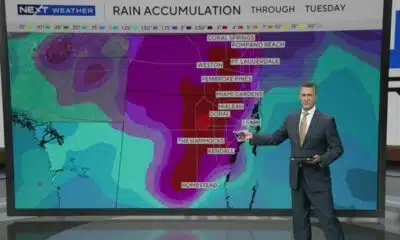News from the South - West Virginia News Feed
Texas man sues California doctor over mailing abortion pills
by Elisha Brown, West Virginia Watch
July 29, 2025
In the first federal lawsuit challenging shield laws, a Texas man has sued a California doctor over allegedly sending abortion pills to his partner.
It is the latest test of shield laws that protect doctors who prescribe abortion medication to patients in states where it’s banned. Texas bans all abortions with narrow exceptions to save a patient’s life, while California protects abortion up to fetal viability and later to save a patient’s health or life.
Skye Perryman, CEO and president of Democracy Forward, a left-leaning legal group involved in litigation about mifepristone and emergency abortion care, told States Newsroom the lawsuit underscores a long-term goal of abortion-rights opponents: to curb access to medication abortion, which has increased despite the U.S. Supreme Court’s decision to overturn Roe v. Wade three years ago.
“It shows the anti-abortion movement and allies of the administration are not stopping at Dobbs,” Perryman said. “This is an escalation of their strategy.”
Jonathan Mitchell, former Texas solicitor general, filed the lawsuit July 20 in the U.S. District Court for the Southern Division of Texas, Galveston division, on behalf of Jerry Rodriguez.
Dr. Rémy Coeytaux “purposefully and knowingly mailed abortion-inducing drugs into Texas,” the complaint states, and is accused of “aiding an illegal self-managed abortion” that led to the death of a fetus.
Neither Mitchell nor Coeytaux would comment on the record Wednesday.
Rodriguez was dating a married woman who became pregnant twice last year, and whose husband ordered abortion medication from California, according to the complaint. She became pregnant again in May, the lawsuit states, and Rodriguez is fearful her husband will pressure her into taking abortion pills.
Rodriguez is seeking more than $75,000 in damages and an injunction to prohibit the doctor from prescribing abortion medication to Texans.
Several laws are cited in the complaint, including Texas abortion statutes, a wrongful death claim and a 19th century law that abortion-rights opponents argue could be used to restrict the mailing of abortion pills.
“This is a typical approach that we see from the anti-abortion movement, and Jonathan Mitchell in particular, which is to throw all the spaghetti up the wall and to see what sticks,” Perryman said.
Mitchell is often associated with crafting the “bounty-style” six-week abortion ban that took effect in Texas in September 2021. He once represented a Galveston man who sued his ex-wife’s friend and accused them of helping her get abortion pills. He dropped the lawsuit in October, The Texas Tribune reported.
Laws in California, where the doctor lives, offer broad protections for providers and patients. Gov. Gavin Newsom and Attorney General Rob Bonta, both Democrats, have vowed to defend California’s abortion access.
The state’s shield law, effective since January 2024, prohibits officials from delivering a person accused or charged with a crime related to providing reproductive health care to out-of-state law enforcement officials.
But California’s protections for abortion providers haven’t been tested. New York’s shield law has been a target for prosecutors in states that ban abortion.
In December, Texas Attorney General Ken Paxton filed a civil lawsuit against a New York abortion provider for allegedly prescribing pills to a Collin County woman. In January, a Louisiana district attorney filed criminal charges against the same doctor for allegedly sending abortion pills to a teen.
New York officials pledged to protect the physician. A county clerk in New York rejected another request from Paxton to file a judgment in the case this month.
“Our response to their baseless claim is clear: no way in hell,” Democratic Gov. Kathy Hochul said in a July 14 statement. “New York won’t be bullied. And I’ll never back down from this fight.”
Eight states, including California and New York, explicitly allow providers to prescribe abortion medication to patients in states where pregnancy termination is banned.
Rodriguez’s lawsuit is the first to challenge a shield law in federal court. Dr. Angel Foster, co-founder of the Massachusetts Medication Abortion Access Project, said telehealth abortion providers treating patients in states with bans “always envisioned that there would be legal challenges to the work that we’re doing.”
But Foster said her team remains undeterred. “You can’t put this genie back in the bottle,” she said. “Medication abortion pills are here to stay, regardless of what happens with these pills and how they’re regulated in the United States.”
Telehealth abortions make up 1 in 4 of all pregnancy terminations provided in the U.S., according to the Society of Family Planning’s #WeCount report released last month. Nearly 50% of all telehealth abortions provided in 2024 were overseen by doctors or other qualified health care professionals living in shield states, the report found.
Beyond challenging shield laws, Rodriguez’s argument leans, in part, on fetal personhood — the theory that fetuses and embryos should have legal rights akin to human beings — by seeking monetary damages for an aborted fetus.
Rodriguez is looking to hold the manufacturers and distributors of the abortion pills used liable “for the wrongful death of Mr. Rodriguez’s unborn child,” the lawsuit states, “and they will be added as defendants once identified.”
He’s also accusing the doctor of violating the Comstock Act of 1873, which banned the mailing of anything deemed “obscene, lewd, lascivious” or morally impure, including abortifacients and abortion-related materials. The statute was weakened in the mid-20th century, but Congress never repealed it.
Mitchell and anti-abortion activist Mark Lee Dickson have led piecemeal efforts to resurrect Comstock in cities and counties throughout Texas and New Mexico with proposed anti-abortion ordinances based on the law.
In 2022, the U.S. Department of Justice’s Office of Legal Counsel under former Democratic President Joe Biden issued a memorandum opinion that said the U.S. Postal Service can mail abortion medication, because senders do not know they may be used unlawfully. Mifepristone and misoprostol are also used to treat miscarriages, and misoprostol is used for various reproductive health conditions, such as postpartum hemorrhaging.
Republican President Donald Trump’s administration has not said publicly whether Comstock is enforceable. In a January letter, Americans United for Life and other anti-abortion groups urged DOJ officials to rescind the memo.
Any effort to repeal Comstock would be unlikely, given the GOP’s control on Capitol Hill. But Democratic Minnesota Sen. Tina Smith reintroduced a bill in March to undo parts of the law that could curb medication abortion access. The legislation has not moved beyond committee referral.
“These extreme Republicans and dust-covered laws from 1873 should not be directing a woman’s right to make her own health care decisions,” Sen. John Hickenlooper, a Colorado Democrat who co-sponsors Smith’s measure, said during a call with reproductive health workers earlier this month.
Republican Missouri Sen. Josh Hawley has been one of the most vocal congressional opponents of abortion pills. Hawley introduced a measure in May that would require federal health officials to reinstate older regulations on mifepristone, which would effectively stop providers from mailing abortion medication to patients.
“I’m introducing the Restoring Safeguards for Dangerous Abortion Drugs Act after a bombshell study revealed the truth about mifepristone: it’s dangerous,” Hawley said in a statement.
The paper he referenced was non-peer reviewed and released by an anti-abortion think tank, States Newsroom reported. But U.S. Health and Human Services Secretary Robert F. Kennedy Jr. did order a review of mifepristone, despite decades of evidence pointing to the drug’s safety.
West Virginia Watch is part of States Newsroom, a nonprofit news network supported by grants and a coalition of donors as a 501c(3) public charity. West Virginia Watch maintains editorial independence. Contact Editor Leann Ray for questions: info@westvirginiawatch.com.
The post Texas man sues California doctor over mailing abortion pills appeared first on westvirginiawatch.com
Note: The following A.I. based commentary is not part of the original article, reproduced above, but is offered in the hopes that it will promote greater media literacy and critical thinking, by making any potential bias more visible to the reader –Staff Editor.
Political Bias Rating: Center-Left
This content provides a detailed account of a legal challenge involving abortion pill access and reproductive health shield laws, presenting perspectives from both pro-choice advocates and anti-abortion activists. The article relies on factual reporting with a slight emphasis on protecting abortion rights, including quoting left-leaning legal experts and Democratic officials defending abortion access. It also highlights criticisms of anti-abortion legal strategies and contextualizes them within broader political debates. Overall, the tone favors reproductive freedoms but maintains balance by addressing opposing viewpoints, placing it in the center-left spectrum.
News from the South - West Virginia News Feed
WV Supreme Court will hear BOE’s appeal in vaccine lawsuit — but not right away
by Lori Kersey, West Virginia Watch
September 5, 2025
West Virginia’s highest court will take on a legal battle over the state’s school vaccination requirements, but it denied a request by state school officials that it do so quickly.
The state Supreme Court on Thursday set a deadline of Dec. 12 for the West Virginia Board of Education to prepare its appeal of a Raleigh County judge’s July ruling against it. That ruling was in regards to a lawsuit brought by three Raleigh County families over the board’s refusal to accept religious exemptions to the state’s mandatory school vaccine requirements.
Raleigh County Circuit Judge Michael Froble in July granted a preliminary injunction in the case that allows students in the case to attend class with a religious exemption to the vaccination requirements.
The school board had filed notice of appeal and asked the high court to both expedite a review of the appeal and temporarily halt the proceedings in the lower court.
In the scheduling order Thursday, the court denied both motions. Justices also set a deadline of Jan. 26 for the plaintiffs in the case to respond to the board’s appeal. The board will then have until Feb. 16, 2026 to write a reply, if necessary.
After the Feb. 16 reply brief deadline, the court writes, the appeal will be ready for review.
The Raleigh lawsuit is one case in a legal battle over religious freedom and the state’s strict school vaccination requirements. Every state requires school students to be vaccinated against a number of infectious diseases including polio, chicken pox and measles. Florida officials announced this week plans to eliminate its vaccine mandates.
West Virginia has been one of only five states that have not allowed students to opt out of the shots because of their religious or philosophical objections to them.
West Virginia Gov. Patrick Morrisey issued an executive order on his second day in office requiring the state to allow religious exemptions. His order is based on the 2023 Equal Protection for Religion Act. He argues that the religious freedom law, when read alongside the vaccination law, calls for the religious exemptions.
Morrisey has not rescinded that executive order, even though the state Legislature earlier this year rejected a bill that would have established those religious exemptions in state code.
Raleigh County Circuit Judge Michael Froble has scheduled a two-day hearing next week on a permanent injunction in the lawsuit, which he recently consolidated with a lawsuit brought against the state health department by two parents of immunocompromised students over its issuance of religious exemptions. Plaintiffs in that case are represented by the ACLU of West Virginia and Mountain State Justice.
The hearing is set for Sept. 10 and 11 at the Raleigh County Judicial Center. During that hearing, the judge has said he wants to consider issues that include whether the state’s vaccination law is constitutional without religious exemptions and the authority of Morrisey’s executive order.
YOU MAKE OUR WORK POSSIBLE.
West Virginia Watch is part of States Newsroom, a nonprofit news network supported by grants and a coalition of donors as a 501c(3) public charity. West Virginia Watch maintains editorial independence. Contact Editor Leann Ray for questions: info@westvirginiawatch.com.
The post WV Supreme Court will hear BOE’s appeal in vaccine lawsuit — but not right away appeared first on westvirginiawatch.com
Note: The following A.I. based commentary is not part of the original article, reproduced above, but is offered in the hopes that it will promote greater media literacy and critical thinking, by making any potential bias more visible to the reader –Staff Editor.
Political Bias Rating: Centrist
The content presents a factual and balanced overview of the legal dispute surrounding vaccine exemptions in West Virginia without evident partisan language or framing. It reports on actions taken by government officials, court decisions, and ongoing lawsuits from multiple perspectives, including those of the state board, families, and advocacy groups. The neutral tone and focus on legal developments suggest a centrist approach, aiming to inform rather than persuade toward a particular political viewpoint.
News from the South - West Virginia News Feed
Christian’s Morning Forecast: Strong to Severe Storms Incoming
SUMMARY: Storm Watch meteorologist Christian Boler reports strong to severe storms approaching West Virginia, especially McDow, Tazewell, and Wyoming counties during the morning commute. Temperatures will remain in the upper 60s to low 70s with southwest winds around 5-10 mph. A marginal severe weather threat exists across the region, mainly involving winds and flooding, but no tornadoes or hail expected. Rainfall of a quarter to half an inch is likely over 48 hours with isolated downpours. Storms will arrive in two waves before clearing Friday. Another front may bring showers Saturday, but high pressure will clear skies for the weekend and beyond.
FOLLOW US ON FACEBOOK AND TWITTER:
https://facebook.com/WOAYNewsWatch
https://twitter.com/WOAYNewsWatch
News from the South - West Virginia News Feed
More states guarantee students the right to school-day religious instruction off campus
by Robbie Sequeira, West Virginia Watch
September 4, 2025
In the past month or so, federal courts have dealt a string of blows to conservatives’ push for the biblical Ten Commandments to be posted in public schools.
Yet as states lose over required religious displays, many are working on another route to faith-based education by allowing kids to attend off-campus religious instruction. This year, Iowa, Montana, Ohio and Texas passed laws guaranteeing parents the right to have their children excused during the school day for free, off-campus religious instruction, often called “released time.”
Those four states are the latest of at least 12 that require school districts to offer released time religious schooling upon parental request, including: Florida, Hawaii, Kentucky, New York, North Dakota, Pennsylvania, Vermont and Wisconsin.
The released time approach may be more likely to pass constitutional muster than other government-imposed religious efforts, experts say, by shifting influence off school grounds and under the direction of faith-based groups rather than public school teachers, and by making it free to students.
A 1952 U.S. Supreme Court decision in Zorach v. Clauson allows for released time religious instruction as long as it’s off school property, privately funded and parent permitted.
“Not every family has access to private or parochial school, but for many generations families have been able to take their students out of school for a portion of the day for religious education if they choose,” said Jennifer Jury, a program advocate for LifeWise Academy, an Ohio-based Christian nonprofit founded in 2018.
The organization has been active in expanding its reach and lobbying lawmakers for stronger legislative support. This school year, LifeWise expects to serve nearly 100,000 public school students across 1,100 schools in 34 states, Jury said.
The off-campus gatherings work the same way in most states: With parents’ approval, public school students sign out of school during a lunch, recess or study hall block. Students will either walk or ride one of the distinctive red LifeWise buses to a local church or a program-leased community building in town.
And depending on state limitations for the religious instruction, for either a half or full hour, kids will learn about the Bible. When the allotted time is up, students go back to their public school to finish the day.
In some states, students can earn academic credit for the off-campus instruction, which has been more controversial.
In Montana, for example, legislation that would have required school districts to develop policies for academic credit was amended to “authorize” a district to allow credit, after pushback from the state’s school boards and school administrators associations.
“School districts should have the autonomy to determine which external coursework aligns with the academic frameworks and whether such courses should be eligible for credit,” Rob Watson, who represented the two groups at the legislature, said in his comments to a House committee in February. He noted the groups did not oppose the released time policy itself.
Despite the changes, only one Democrat in the legislature voted “yes.” Montana GOP Gov. Greg Gianforte signed the bill into law in May.
Supporters had touted the academic credit option as a way to entice homeschooling families to consider public schools. In her interview with Stateline, Jury noted similar programs that accommodate Jewish, Muslim and Mormon faith-based teaching for public school students.
“Whether a person is religious or not, the Bible is widely recognized as one of the most influential books in history,” Jury said. “A lot of our Western culture was born out of ideas that come from the Bible, like the fact that every person is created equal, that we are to love our neighbor.”
Identical bill language
The conservative American Legislative Exchange Council, known as ALEC, in August adopted model legislation about released time policies that state lawmakers can propose.
Public schools would be required to allow dismissal for religious instruction under new bill
ALEC’s proposal would allow from one to five hours per week of off-campus religious instruction and would require school districts to award academic credit if the course meets certain criteria. Districts would have to assess instruction based on secular standards and would not be allowed to test for particular religious content, according to the model legislation.
Nearly identical language had already appeared in several state bills, including in North Carolina and West Virginia this year and in Mississippi in 2023. In North Carolina, LifeWise Academy registered with the secretary of state’s office in 2024, as reported by NC Newsline, and a released time bill was introduced in February. It was sent to committee but never moved ahead.
The bills in Mississippi and West Virginia also stalled.
Legislation that does become law earns praise from groups such as Alliance Defending Freedom, one of the nation’s most active legal organizations opposing abortion rights and same-sex marriage.
Statements from Greg Chafuen, senior counsel for the nonprofit’s Center for Public Policy, say the new released time laws respect “parents’ educational decisions” and ensure “parents are in the driver’s seat when it comes to their kids’ education.”
An Indiana law lets high school students leave school for religious instruction each week for an amount of time equal to one elective course. Ohio, Oklahoma, South Carolina and Tennessee laws allow students to earn elective credit for released time religious instruction, though it cannot replace a “core curriculum” class. School boards can set standards for when such programs qualify for credit.
LifeWise operates in each of those states.
Ten Commandment displays
Jury, of LifeWise Academy, said her organization wants off-campus religious options for public school students to be available in all 50 states.
“It’s important to note this is an option, and parents are the ultimate decision-makers in enrollment,” she said.
“We would love to see every student in the United States have the option to attend a program like LifeWise if they want to and if their parents want them to.”
A lack of parental choice might be what trips up state efforts to post the Ten Commandments in classrooms.
This is an option, and parents are the ultimate decision-makers in enrollment.
– Jennifer Jury, a program advocate for LifeWise Academy
After Louisiana last year became the first state in recent decades to require that the Ten Commandments, a central tenet of the Judeo-Christian tradition, be displayed in school classrooms, bills followed in at least 15 other states. Two states — Arkansas and Texas — enacted laws.
But for now, courts have blocked the mandates in all three states. In Texas, U.S. District Judge Fred Biery warned the displays “are likely to pressure [children] into religious observance” and undermine parents’ rights.
In Arkansas, U.S. District Judge Timothy Brooks called the state’s requirement to post a specific version of the Ten Commandments “plainly unconstitutional.”
The law “is not neutral with respect to religion,” he wrote. “By design, and on its face, the statute mandates the display of expressly religious scripture in every public-school classroom and library.”
He also noted that the law “requires that a specific version of that scripture be used, one that the uncontroverted evidence in this case shows is associated with Protestantism and is exclusionary of other faiths.”
Stateline reporter Robbie Sequeira can be reached at rsequeira@stateline.org.
This story was originally produced by Stateline, which is part of States Newsroom, a nonprofit news network which includes West Virginia Watch, and is supported by grants and a coalition of donors as a 501c(3) public charity.
West Virginia Watch is part of States Newsroom, a nonprofit news network supported by grants and a coalition of donors as a 501c(3) public charity. West Virginia Watch maintains editorial independence. Contact Editor Leann Ray for questions: info@westvirginiawatch.com.
The post More states guarantee students the right to school-day religious instruction off campus appeared first on westvirginiawatch.com
Note: The following A.I. based commentary is not part of the original article, reproduced above, but is offered in the hopes that it will promote greater media literacy and critical thinking, by making any potential bias more visible to the reader –Staff Editor.
Political Bias Rating: Center-Right
This content presents the growing trend of religious education programs in public school contexts with a generally favorable tone, highlighting legislative successes primarily in conservative-led states. The coverage includes references to conservative organizations such as ALEC and Alliance Defending Freedom, and discusses efforts to expand religious instruction in a way that aligns with conservative values emphasizing parental choice and the role of faith in education. However, it also acknowledges the legal challenges and concerns over constitutional boundaries, providing a balanced view that avoids outright advocacy or criticism. The framing and topics suggest a center-right perspective that supports religious accommodations within public education while respecting legal constraints.
-
Mississippi Today7 days ago
DEI, campus culture wars spark early battle between likely GOP rivals for governor in Mississippi
-
News from the South - Louisiana News Feed6 days ago
‘They broke us down’: New Orleans teachers, fired after Katrina, reflect on lives upended
-
News from the South - Alabama News Feed7 days ago
Alabama state grocery tax to fall 1% on Monday
-
News from the South - Missouri News Feed5 days ago
Missouri joins dozens of states in eliminating ‘luxury’ tax on diapers, period products
-
News from the South - Tennessee News Feed5 days ago
Tennessee ranks near the top for ICE arrests
-
Mississippi Today5 days ago
Trump proposed getting rid of FEMA, but his review council seems focused on reforming the agency
-
News from the South - South Carolina News Feed7 days ago
Warm and Mainly Dry Labor Day
-
News from the South - North Carolina News Feed6 days ago
NC Labor Day 2025: A state that’s best for business is also ranked worst for workers










































